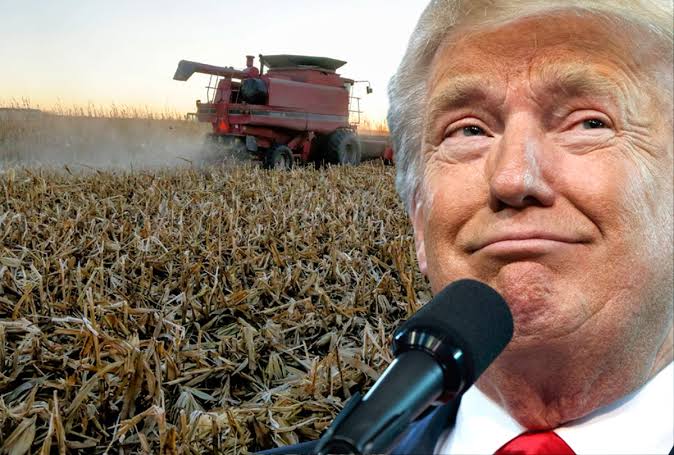‘Swamp politicians’ undermine Trump’s trade agenda and threaten American farmers

By M A Hossain
When President Donald Trump unveiled his “America First” trade agenda, it wasn’t just a campaign slogan – it was a seismic shift in US trade policy. Trump’s tariffs were designed to protect American workers, reward domestic production, and balance the scales of global trade that had for decades left the US heartland behind. His ‘Big Beautiful Bill’ aimed to revitalize manufacturing, secure rural livelihoods, and rein in the unchecked influence of globalists and their special interest allies.
But today, as that vision faces a crucial test in Congress, it appears the swamp is quietly chipping away at the very core of Trump’s legacy – and doing so in a way that threatens to devastate the very people he fought to protect.
Tucked into the latest House version of a trade-related bill is a provision that would repeal a critical policy tool known as the “duty drawback.” On its surface, it might sound technical or even arcane. But in practice, this mechanism is vital to reducing America’s trade deficit, increasing exports, and keeping small farmers and domestic manufacturers afloat in a brutally competitive global market.
Under current trade policy, US farmers and manufacturers who import raw materials – like fertilizer, steel, or chemicals – pay tariffs, in line with Trump’s strategy to shield American producers from foreign price dumping and exploitation. But if these imported materials are later used to manufacture goods that are sold abroad, or if American exporters ship out products similar to those imported, they can reclaim some of those tariffs through duty drawbacks. This isn’t a loophole. It’s a deliberate, pro-export feature of Trump-era trade reforms.
Eliminating it would be the economic equivalent of kneecapping a racehorse – sabotaging the very people and industries that America depends on to win in global markets.
Consider the tobacco industry, now directly in the crosshairs of this provision. While tobacco may not be politically fashionable, it remains a vital lifeline for many US farmers, particularly in the Southeast.
According to Kimberly Foley, Executive Director of the Tobacco Association (TA), “Duty drawback plays a quiet but essential role in keeping US leaf attractive on the international stage.” Without it, American-grown barn-cured tobacco would struggle to compete, threatening not just one crop, but entire farm economies built around diversified operations – including peanuts, cotton, sweet potatoes, and poultry.
Derek Day, TA Chairman and a grower himself, puts it more bluntly: “Tobacco is what holds the rest of [a farmer’s] operation together.” It’s the financial backbone that keeps thousands of small farms running. Remove that foundation, and you don’t just jeopardize tobacco exports – you destabilize entire rural communities.
This isn’t just about tobacco. It’s a warning shot. Today it’s a rollback on tobacco-related duty drawbacks. Tomorrow it will be soybeans, wheat, corn, cotton, even steel and aluminium. Once Congress starts unravelling these targeted pro-export policies, the door is open for special interests to demand broader repeals – all in the name of “streamlining” or “reforming” trade policy, when what they’re really doing is gutting it.
Those pushing for the repeal claim to be protecting tariff integrity. But they fundamentally misunderstand – or deliberately ignore – the purpose behind Trump’s tariff strategy. These tariffs weren’t meant to punish American producers. They were designed to penalize countries like China for decades of unfair trade practices and to encourage US manufacturing by rewarding global competitiveness. Duty drawbacks enhance that strategy by ensuring that domestic producers who engage in international trade aren’t stuck footing the entire tariff bill on materials used to create exportable goods.
If tariffs are the shield, duty drawbacks are the sword – a way for US industries to not only protect themselves but go on offense in global markets.
Repealing this policy would be a gift to foreign competitors and a betrayal of Trump’s America First agenda. Worse, it would do nothing to address the underlying causes of America’s trade imbalance. Instead, it would penalize exporters, shrink market access for US goods, and deepen rural economic distress.
And make no mistake – the people pushing for this change are not representing the interests of American workers or farmers. They’re the same D.C. insiders and globalist-aligned lobbyists who never accepted Trump’s economic nationalism and who long for the days of multilateral trade deals that sold out American industries in favor of short-term corporate profits.
They don’t understand trade. They don’t understand agriculture. And they certainly don’t understand Trump’s base – the millions of hardworking Americans who want fair competition, not bureaucratic sabotage.
This betrayal is not theoretical. It’s real, and the consequences will be felt at the kitchen tables of family farmers, the shop floors of small manufacturers, and the rural towns that have already been hollowed out by decades of bad trade policy.
Stripping away duty drawbacks is the kind of quiet, technocratic move the swamp excels at – it’s complex, obscure, and easy to overlook. But its impact is devastating.
Congress should be doubling down on policies that increase US exports, not dismantling them. If lawmakers genuinely want to honor Trump’s trade legacy, they should reject any version of the bill that includes this rollback and reaffirm their commitment to the America First principles that brought new hope to forgotten parts of the country.
Voters are watching. Trump supporters are paying attention. And rural America will not forget who stood with them – and who sold them out.
In 2016 and again in 2020, President Trump promised to be a champion for the American farmer, the American worker, and the American manufacturer. Duty drawbacks are not a bureaucratic quirk. They are part of that promise. Gutting them would not just be bad policy – it would be political malpractice.
To the lawmakers in Washington: If you betray Trump’s trade agenda now, you’re not just undermining a policy. You’re undermining a movement. And in November, the people will remember.




